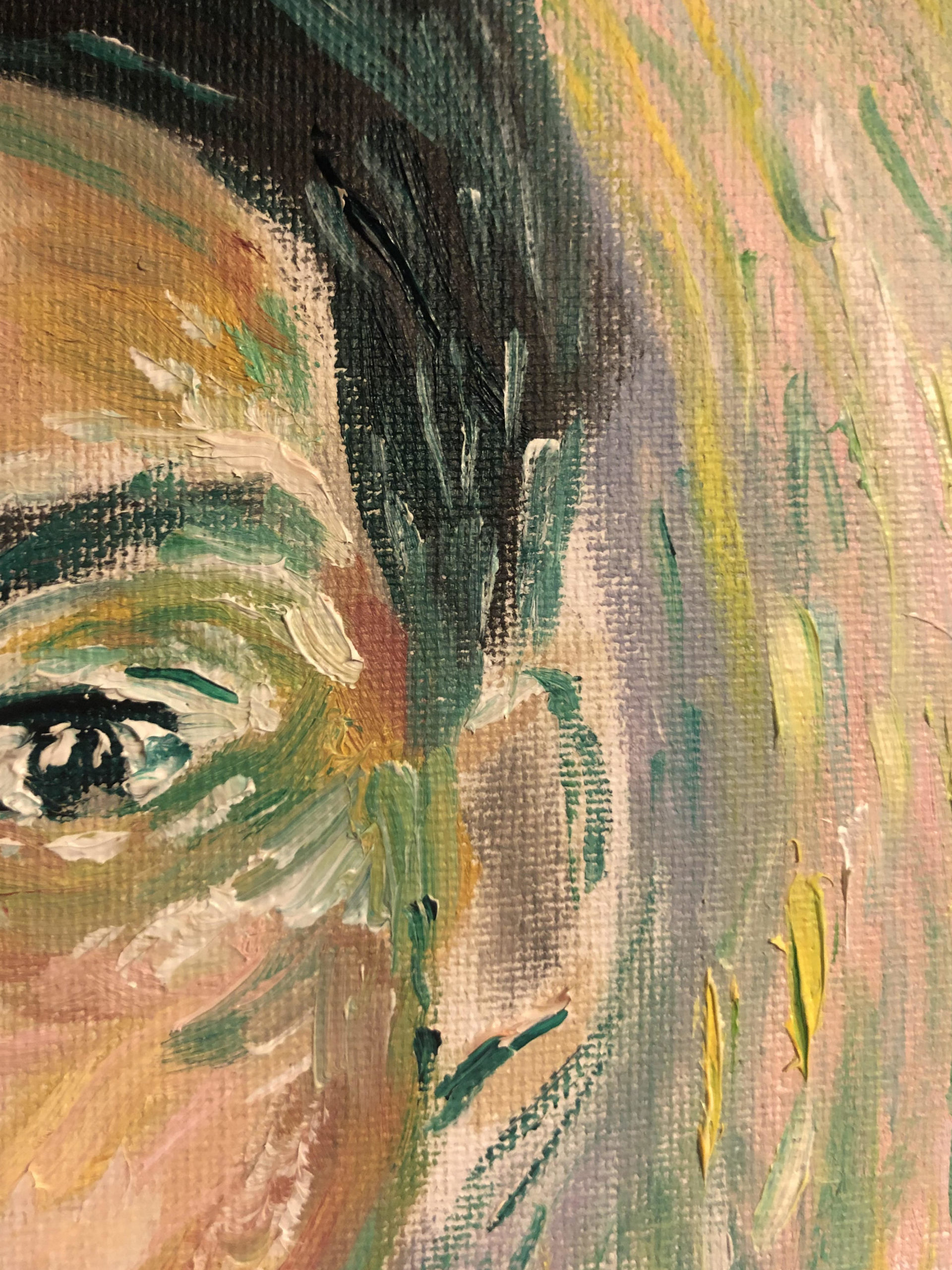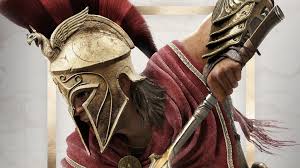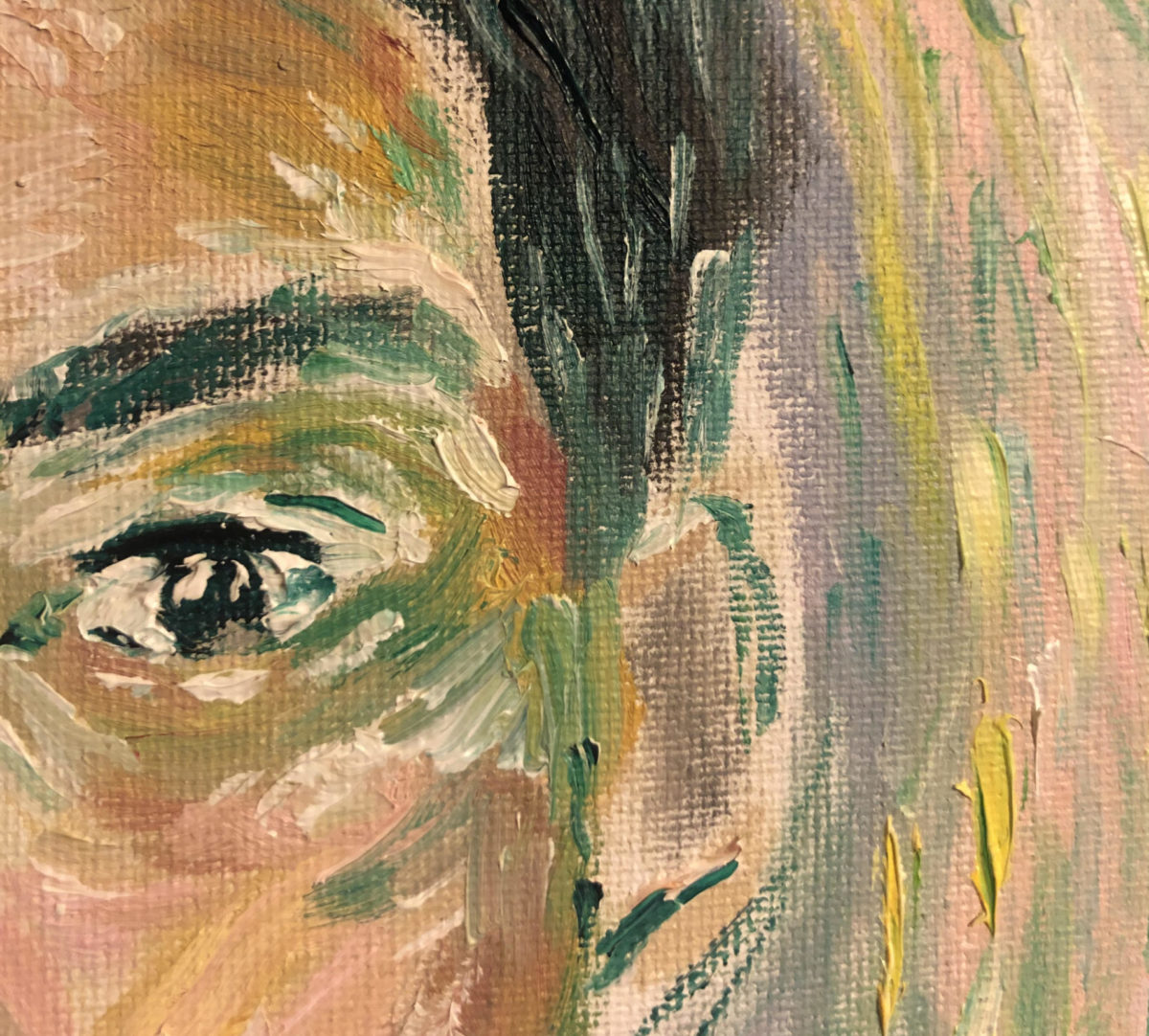A portrait of lockdown

UK galleries and cultural institutions had pretty much all closed by 18 March 2020. I’d been wanting for years to learn to paint: evenings spent in lockdown provided an opportunity to do so. Initially I felt motivated and in high spirits: what better time to paint portraits, and indeed where better to start than painting friends in improbable, heraldic scenes? I had no paints and no real clue of what I was doing, but luckily places like Cass Art and Hobbycraft both offer online shopping (the latter seeing a 200% rise in online sales). In place of a tutor in a class, Youtube abounds with instructional videos with tips of how to get started; to see the whole exercise as experimenting with colour while trying to get the desired effects, and, perhaps more importantly, the inspiration to improve.
Yes, the social aspect of an art class or an evening spent life drawing in a room in a pub is very much lacking, but it’s fun from time to time to send friends a snapshot of my progress, slyly editing the photo to crop out any bits that need more going over. By winter’s lockdown my springtime enthusiasm was slightly on the wane, but that had more to do with the dark evenings and increasing worry about what was in the news. All in all, my attempts at painting have kept me distracted from personal worries, and that’s perhaps no bad thing.
- Frances Forbes-Carbines
An indoor Odyssey

The year we were forced to stay indoors and tempt introspection, I chose to use a window to somewhere else. I have always been a fan of video games: defeated Bowser in Super Nintendo when I was five, raced Princess Peach and Luigi in the Rainbow Road on Nintendo 64 at age of eight, freed dragons from an eternal sleep with Spyro on Playstation 1 as a 12 year old and I became a decent tennis player thanks to Wii at 16. How much I thank being a 90’s baby!
Since a very young age I could spend hours immersed in another world, having adventures of my own and taking a break from ‘reality’. This year, that love for other worlds helped me feel less enclosed in a flat. I discovered one of the best games created: Assassin’s Creed: Odyssey. The game takes you through an epic Greek adventure, allowing you to create your own destiny, as a legendary Spartan hero. I chose to play as Kassandra, accompanied by her inseparable eagle, Ikaros while exploring the magnificent Greek islands during the intrigue of the Peloponnesian War.
I was introduced to the game by my boyfriend, but he didn’t really have to take much time selling it to me. The moment we began to play I was trapped. First of all I loved the idea of playing together, secondly we were no longer sitting on the couch, we were sailing across the Mediterranean on a ship sailed, and serenaded, by Spartan soldiers and thirdly, we were looking at sunny blue skies and thin white sand.
During my adventures I got to enjoy a conversation with Socrates and attended a symposium with Pericles while visiting Athens; I fought the Minotaur and played tribute to Aphrodite; rode a horse through Greek mountains and helped city states regain power from abusive overlords; and won powerful weapons and heavy shields. But most importantly, I got a window to somewhere.
- Mariana Holguin
Model behaviour
Early on in lockdown I decided to indulge myself by buying myself the Christmas present I was too embarrassed to ask for. It seems Lego’s Saturn V rocket was the cosmic darling of lockdown, as by April the price and the waiting times had risen significantly. However, once I got my hands on it it was a joy putting it together — the satisfaction of construction not one I’d felt since I was eight. The final result is a fitting plastic testimony to the endeavour of the Apollo missions, makes an excellent Zoom talking point (all the rocket stages are detachable so you can recreate the mission in your living room) and the Saturn V is in Lego’s ‘Ideas’ range so is definitely (probably) for adults.
Buoyed by my Lego success and the slow Zen found in building something in silence without cursing or crying I decided to level up and bought a starter Airfix kit of HMS Victory. Having conquered space I felt invincible. But Airfix is a cruel mistress for would-be modellers. The world of Airfix is altogether grittier, harsher and more discerning than Lego. You need a pep talk from a drill sergeant…
The box was clearly marked ‘beginner’, it involves glue and paint, classes itself as a ‘chemical toy’, says you might need to ‘shave’ the ‘decals’ and it is generally very small, fiddly and difficult. I am bad with my hands: I break drills, shout and kick things. So, I really did want to conquer this and prove to myself that I did have the patience to really craft a model (however basic).
I failed completely. After five minutes of clamping the hull together with my fingers the glue still hadn’t set. When I then tried to attach the second mast it broke the deck because it didn’t fit in the hole. I gave up. There are only 19 parts total; I only managed to put two together (plus the stand!).
In short, I showed none of the resolve and determination of Victory’s famous admiral. I remain in awe of those adults and children who do achieve great things with Airfix — check out Airfix and Chill — but I consider myself happily retired/dishonourably discharged from this field of model combat.
- Alex Matchett
“Good television can make our world a better place” (Christiane Amanpour)
If your business is going and meeting people, buying coffees and explaining ideas, then lockdown brought normal activity to a shuddering halt. We’ve all adapted (I was already familiar with Zoom, thank God, so my learning curve wasn’t as steep as it might have been), but the process is still ongoing, and no-one really knows where the “new normal” will settle.
Some people have been wading through all the books they’d been meaning to read, whether new titles fresh from the press or old favourites being savoured like a barrel-aged whisky. I wanted to do that too, but I discovered that, in common with a lot of people, my concentration span had suffered with my social life. Some underlying restlessness made it difficult to focus for those long, leisurely afternoons when you lope through hundreds of pages at a time.
Nevertheless, my brain is hungry and acquisitive. It always has been. It’s not always very discerning—I’m as vulnerable to a Wikipedia rabbit hole as the next person—but it craves new information. So I’ve taken a multimedia approach. My to-read pile of books (below) is absurd, and is fattening every week, but I’ve chipped away at it.
There are other sources too, however. YouTube has delivered some gems: the whole of Robert Hughes’s groundbreaking 1980 documentary series The Shock of the New is there, still fresh, swaggering and provocative, and an idle browse has unearthed some other gems, like a Met-produced programme on la Belle Époque fronted by Douglas Fairbanks Jr and Diana Vreeland.
My chief glory, however, has been the BBC’s iPlayer. I hadn’t realised until recently that it not only provided a catch-up service for programmes you’d missed during the week, but was also a repository of great, glorious and quirky productions from the Corporation’s history. The Debate Continues was a wonderful 1950 piece about the reconstruction of the House of Commons chamber after its wartime destruction; Minding Our Language explored the history and development of Ulster Scots; and there were documentary classics from the archives like Man Alive and landmark dramas like Abigail’s Party. It’s a banquet, with everything from rich, heavy main courses to the lightest of fancies.
Do I really want my lockdown message to be “watch more TV”? Maybe. I don’t have the snobbish view that everything on the small screen is bad (I may expound on that at greater length one day); and for new generations it is a major, if not the primary, form of absorbing information. Really, it is just a medium, and there is good television and bad television. The combination of lockdown and the archives of the internet allowed us space to be more selective, and enjoy some genuine classics.
- Eliot Wilson

